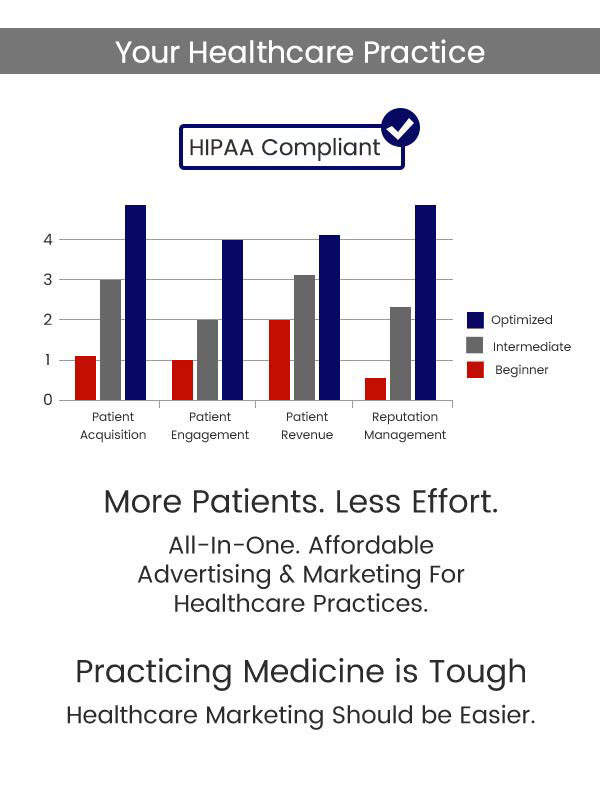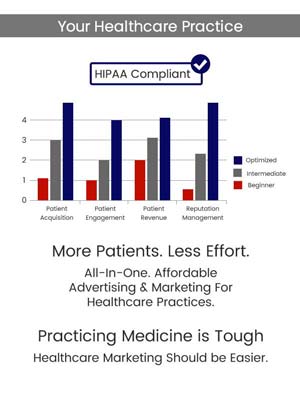Profitable Google Adwords for Doctors and Dentists (also known as Google ppc ads) Cost is $299/mon + 18% of the ads spend for a single location practice.
Google PPC Ads for doctors help medical practices reach their target patients by appearing at the top of Google search results, usually even higher than AI results. Doctors can use Google PPC Ads to target patients based on their healthcare needs, location, healthcare service (like DOT physical exams, Invisalign) and there are many more options, with careful setup and without violating HIPAA laws. However Google PPC ads are not simple to setup and definitely require constant investment of a professional staff to manage the ads, negative keywords, update ad copy, adjust bids, and also review the ads target page and website for user experience. Based on our 10+ years of experience, we can confidently say that Google PPC ads produce higher ROI than social media ads for medical and dental practices.
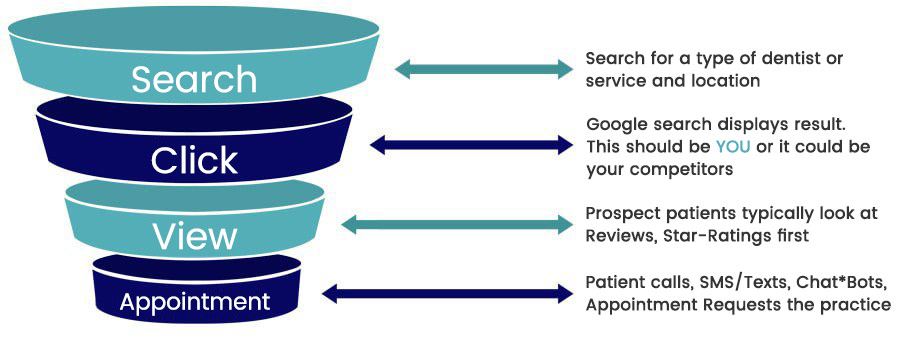
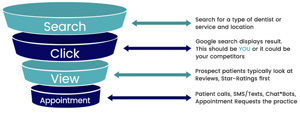
Every day, PatientGain gets inquiries from medical doctors, dentists, practice managers, and all different types of healthcare practices. Key question asked is “Does it make sense to advertise my healthcare practice on Google Adwords?” And the answer is YES. Based on our experience, from the last 10+ years, and running thousands of Google Adwords campaigns for medical doctors, dentists, practice managers, and all different types of healthcare practices, Google Adwords campaigns have an excellent ROI (return on investment). However, the cost of the ads can be very high. If we look at the overall ROI, then we highly recommend Google PPC ads for more than 90% of our customers. Only in certain conditions, PatientGain would not recommend Google PPC Ads. Another question comes up : What about Bing, Yahoo and other search based PPC Ads? After testing and running campaigns on many different platforms, we do not recommend other platforms. The reason is very low ROI, and algorithms of Bing, Yahoo, and several other platforms are not consistent, and results are very spotty. It is also found that these other platforms do not provide good control of ads targeting, tools to debug the patient intent, which ultimately results in lower ROI compared to Google PPC ads.
Google Ads 3 different types of ads and key differences:
| Feature | Google YouTube Ads | Google Display Ads | Google PPC Ads |
|---|---|---|---|
| Ad Format | Video (skippable, non-skippable, bumper) | Visual (banners, images, rich media) | Text-based ads |
| Audience Intent | Passive but engaged viewers | Passive browsers | High-intent searchers actively seeking care |
| Best For | Building trust and awareness | Increasing brand visibility and retargeting | Driving direct patient appointments |
| Targeting | Interests, demographics, video content | Topics, audience, retargeting | Keywords, location, demographics |
| Engagement Type | Visual storytelling | Visual reminders | Action-oriented search clicks |
| Cost | Pay-per-view or impressions | Cost-per-thousand impressions (CPM) | Pay-per-click (CPC) |
Comparing PPC Google Ads Vs Google Local Search Ads
Google search also offers Local Search Ads. These ads are available for certain specialties only. For example for dental practices these can be used. However they cannot be used for most medical and healthcare practices.
Pros of Google Local Search Ads:
- Increased Visibility: Local Search Ads are prominently displayed in search results, making it easier for potential customers to find us.
- When users search on their mobile devices for nearby businesses on Google.com, your business location may be featured at the top of the local results.
- Targeted Reach: These ads focus on users searching for specific services in our area, enhancing our relevance.
- Mobile Optimization: The ads are designed for mobile devices, which is essential since many users search for local services on their phones.
- Pay-Per-Lead Model: You only pay for leads generated through the ads, making it cost-effective and easier to manage your budget.
Cons of Google Local Search Ads:
- Competition: Depending on our industry and location, competition for local search ads can be intense, potentially driving up costs.
- Limited Control: We have limited control over ad placement and ranking, which is largely determined by Google’s algorithms.
- Keyword Restrictions: May not have full control over the keywords for which our ads are displayed, making it harder to target specific terms.
- HIPAA Compliance Risks: If phone calls and leads are recorded, there’s a risk of violating HIPAA regulations if sensitive patient information is discussed.
Table of Contents:
1) Techniques Used by Top Healthcare Practices in US & Canada.
2) So what is a “Quality Score”?
3) What determines my Quality Score with Google Ads?
4) Example 1: Google PPC ad for a medical practice
5) Example 2: Google PPC ad for a dental practice
6) Example 3: Google PPC ad for a medical spa
7) Why should I be trying to improve my Quality Score for Google ads?
8) How do I increase the Quality Score of My Google Ads?
9) What is the key to a good Quality Score?
10) Do these concepts apply to other ad networks?
11) How Much Should You Pay For Professional Adwords PPC Management For Healthcare Clinics, Physicians & Doctors?
12) Can my competitors click on my Google PPC ads and waste my money?
13) Will I see my ppc ads all the time?
14) Should Doctors Run Google Ads? Or Advertising in General? If a medical practice or doctor has excellent SEO rankings, does she still needs to do online advertising?
15) SEO Based Medical Marketing ROI Calculated – Example
Techniques Used by Top Healthcare Practices in US & Canada.
Some doctors hire third-party internet advertising companies to manage their Google ads also known as pay per click advertising efforts, also known as PPC advertising. However, other doctors will want to handle this digital marketing effort in-house. There are advantages and disadvantages to this approach. If you run the ads yourself: On the plus side, you will be able to make changes immediately, customizing messages on the fly, and you won’t pay any management fee. On the other hand, you may not have the expertise to make sure your ads are fully optimized, your time may be limited causing your ads to stagnate, and you may not see how your ads are performing compared to similar top clinics. As a practice owner of a practice manager, you should be very selective on who manages your ads. Our data shows that in order to run successful Google AdWords campaigns, the company must be a specialist in healthcare. Most of the Google Adwords internet advertising companies for doctors put your ads on auto-pilot and they do not look at the details of how the conversion is performing. In addition, there is no knowledgeable person who is reviewing the data. For example if you have a pain management practice ad that advertises your practice as “Live Pain-free Now, Call Us” – PatientGain would consider this an unethical ad. Same goes for promoting your practice as a “ADHD specialist for Teenagers in Palo Alto CA”, but you may be simply a primary care who can treat ADHD patients, and then uses specialists as a referral. Hence this would an unethical ad.
The first step to managing your PPC efforts in-house is to understand the Quality Score used by Google Ads. While there are several valuable online ad networks out there, Google Ads are often the best first choice for doctors. The Quality Score is a significant factor that determines how much you pay for your ad on Google and how effective it is. Think of it like a credit score for a loan or a resume for a job interview. It is a score that tells Google many things and determines how much you will pay for each click of your ad.
So what is a “Quality Score”?
A Quality Score is a rating that is assigned to your PPC ads, and the keywords your medical practice is targeting. This score determines your cost per click, also known as the CPC. For those new to the world of digital marketing, this represents the amount you pay for each click of your ad. Combined with your maximum bid you are willing to pay, it will determine your ad rank in the auction process.
What determines my Quality Score with Google Ads?
Generally, these factors are what effect your Quality Score:
Ad Text Relevance – Your ad text should be relevant to the keywords you are targeting. For example, ad text targeting foot conditions should not be used on keywords related to scalp conditions.
Landing Page Relevance and Quality – The destination of your ad should be relevant to the ad text and keywords being targeted. If your keywords and ads are targeting those who need pediatric services, the landing page should reflect that.
Keyword Relevance – Many doctors make the mistake of loading up their Google account with keywords, but not separating them into ad groups. For doctors, this is vital to maintain a good Quality Score. You should sort keywords into groups immediately. It’s common for doctors to have ad groups reflect the services they offer and seasonal campaigns they are running. The more relevant keywords are in the group, the higher your Quality Score will be.
Ad Click Through Rate – Also known as the CTR, your click-through rate is a good indicator that these are the ads patients want to see for their search results. If you maintain a healthy CTR, this indicates to Google, your ads and keywords are relevant!
Google Ads Account Performance – If you have historically maintained a high performing Google Ad Words account, you will get a boost in your Quality Score. Start that history today by maintaining good ad quality.
Generally, it is believed that your click-through rate (CTR) carries the most significant weight that affects the Quality Score for your ads. This makes sense as a higher click-through rate, as stated above, means your ad is appealing to the right people with the right keywords. If you achieve a good quality score for your ads, your ads will often cost less and achieve a higher ad ranking.
Example 1: Google PPC ad for a medical practice – Urgent care. A parent is looking for an urgent care for children, in a certain area. The ad in the top area is more likely to convert.
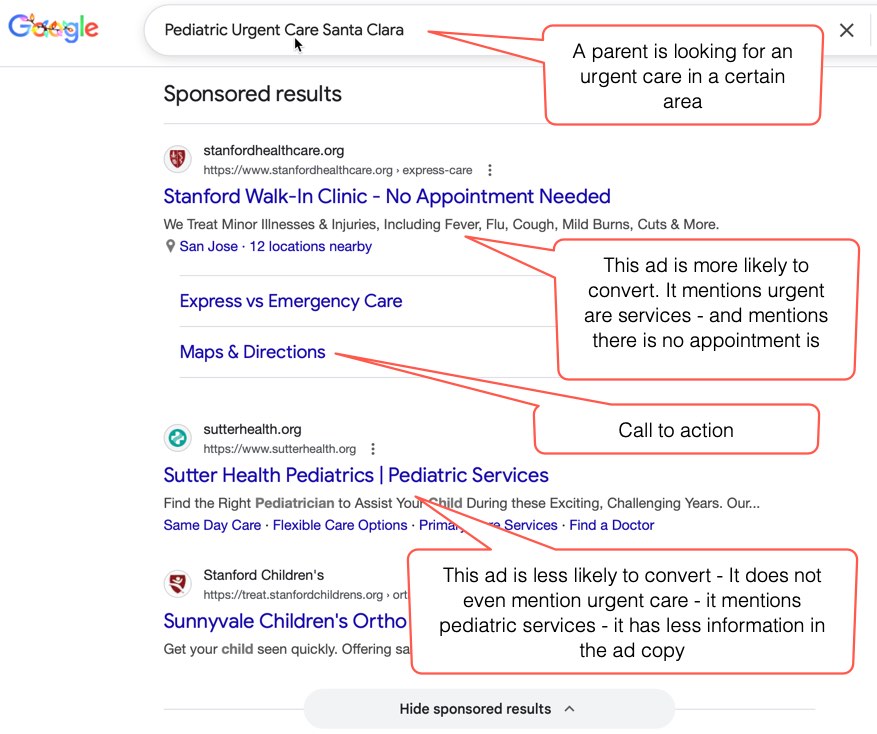
Example 2: Google PPC ad for a dental practice – A patient is looking for a dental practice in certain area and specifically for Invisalign. The 2nd ad has 1) differentiator 2) highlights qualifications and 3) there is an offer in the ad. This ad is highly likely to convert.
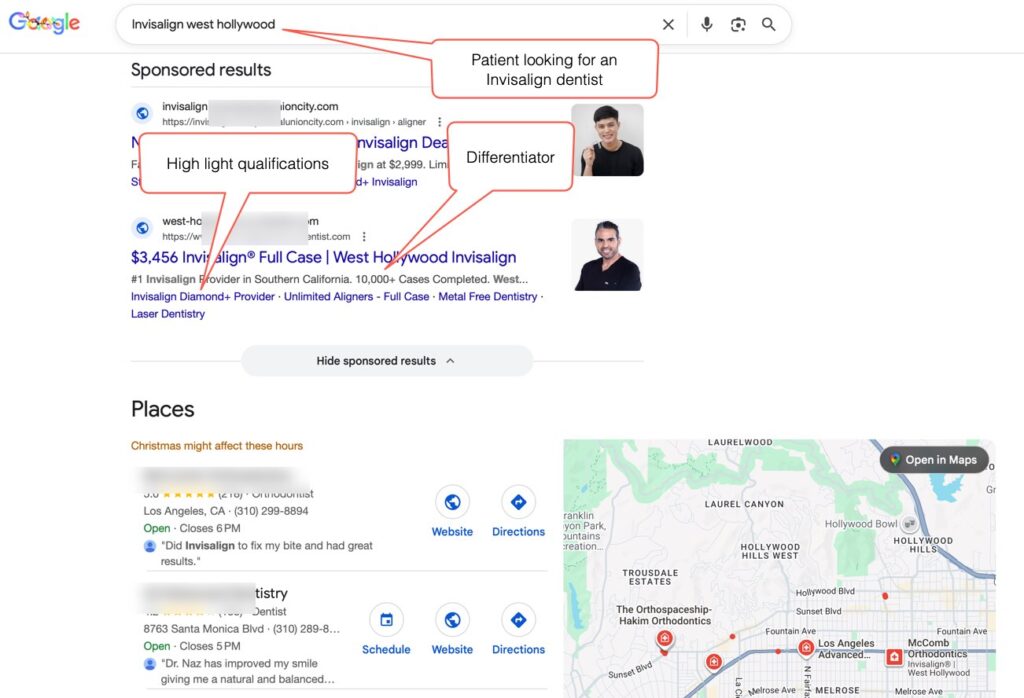
Example 3: Google PPC ad for a medical spa – A client is looking for a medical spa close to them. The first ad has 1) a differentiator 2) Offer 3) Call to Action – All of these strategies cause the potential client/patient to click, and start the conversion process.
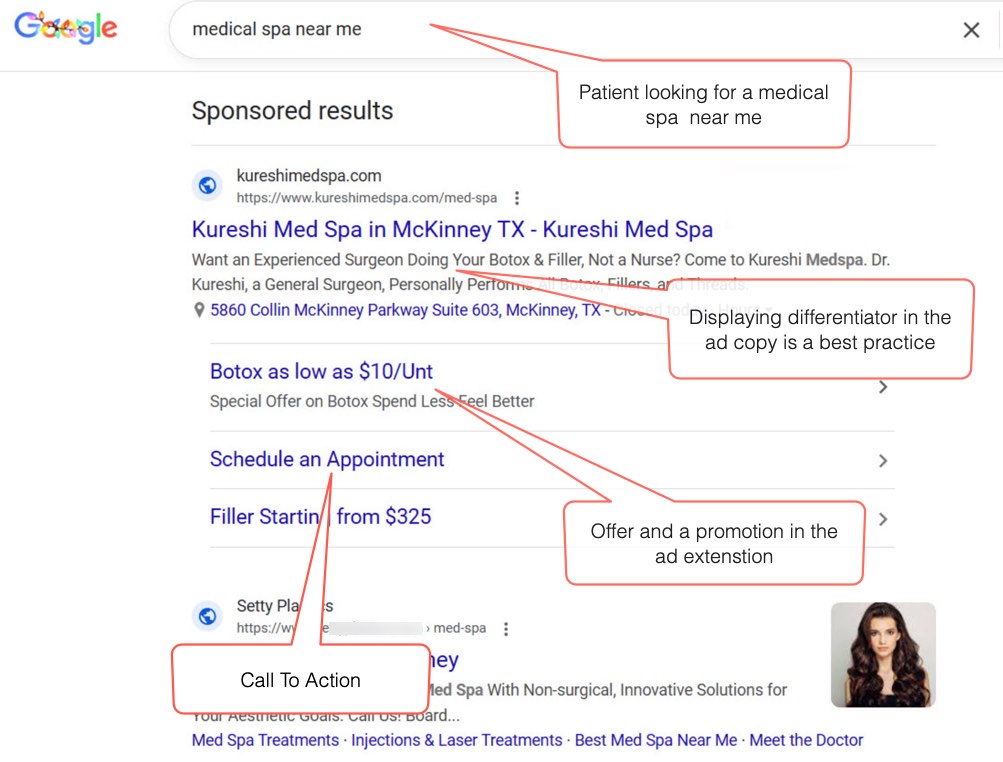
Why should I be trying to improve my Quality Score for Google ads?
Simply put, higher Quality Scores give you a higher return on investment (ROI.) Or in other words, you get more bang for your buck. A higher Quality Score often results in a lower cost per click and cost per conversion. These two terms do not exactly mean the same thing. The cost per click is the amount you are to pay for each click. Cost per conversion is how much you pay for a patient to complete an action, such as making an appointment. Not every click to your ad will result in a conversion, so a cost per conversion is often higher than a cost per click.
A high Quality Score indicates you are meeting the needs of your potential patients with the searches they are conducting. The more relevant ads you have directing people to relevant landing pages, the cheaper your ads will be to run. Google’s overall goal is to lead people to the things they are looking for, and you will be rewarded for that with lower PPC costs if you make your ads relevant to them.
How do I increase the Quality Score of My Google Ads?
The Quality Score is going to play a massive role in the cost of your overall PPC efforts. While you do not need to spend every waking moment of your day working on it (you do have patients to see), you should continuously be working on your account to maintain and improve your scores. In order to do this, there are a few areas you should focus on.
Refine Your Ad Text
Also known as “Ad Copy,” test out different messages for your ads. You may not currently have the best wording for your ads. If you discover an ad that delivers a higher CTR, this will increase your quality score.
Keyword Organization
As mentioned above, organize your keywords into groups. Every now and again, check to see if you have too many keywords in a group. It may be time to split that group up into more manageable keyword groups, which will boost all of their scores.
Keyword Research
Popular and hot topics are always changing in the healthcare industry. New terms may now be associated with your services. Curate the keywords you are using and add new ones that potential patients may be using that relate to your medical practice.
Optimize Landing Pages
Many doctors make the mistake of directing all of their ads to their home page. If you have ads that focus on a service, direct them to the page on your website that highlights that service. By increasing the relevancy of the landing pages to your Google Ad, you will boost your quality score.
Add Negative Keywords
Negative keywords are keywords you specifically do not want to target. Generally, you will want to avoid using broad words as they could accidentally keep your ads from potential patients. For example, if you are an eye doctor, you would want people to find your practice if they used the keyword “Glasses.” However, you would not want your ad to show up for the search “Glasses for cocktail parties.” So, you do not want to block “Glasses,” but you would want to block your ad from appearing for a “Glasses for cocktail parties” search. Many doctors make the mistake of avoiding this critical concept.
What is the key to a good Quality Score?
For a good Quality Score, relevance is critical. Keywords, ad copy, landing pages, and keyword groups all must be relevant when you are creating your pay per click campaigns. You are best served by creating small groups of well-organized keywords. Targeting these PPC campaigns to specific landing pages will give you the best chance to target the patients you want to find your medical practice and the services you are offering.
A low-quality score is usually the result of a disorganized mash of keywords, ad copy, and poor choices for landing pages. If you can clean this up, you have a high chance of improving your Quality Score. There is no magic wand or foolproof way to improve your overall Quality Score. But if you pay attention to the relevance of your ads and where they are sending potential patients, you stand a good chance of accomplishing your PPC goals.
Do these concepts apply to other ad networks?
Yes, Bing uses its own Quality Score to determine the cost of their ads. You can apply these concepts if you decide to run Bing Ads on their network, which will display on their search engines results.
How Much Should You Pay For Professional Adwords PPC Management For Healthcare Clinics, Physicians & Doctors?
Google AdWords Certified Companies Charge $300 to $700/mon for a Typical $2000 to $4000 Budget. In Addition There May Be Setup Fees & Long Term Contracts – Not Recommended.
We recommend Healthcare PPC Pricing For Doctors Physician should be 18% Flat Fee
Read more
Can my competitors click on my Google PPC ads and waste my money?
Yes – This is a common problem in the world of advertising. However, Google PPC ads are one of the most secure and effective ways to advertise.
For example consider these 2 examples.
Example 1 : You just hired a traditional advertising company to promote your new medical practice, let’s say an Urgent Care in Davie FL. This company has decided to display “New Urgent Care is OPEN!!! Now” and it is being displayed on all 34 regional buses in the Davie Florida area. You signed a contract of $3000/month advertising fee for a 12 month contract. Hundreds of thousands of people who ride buses are likely to see your ads. However approx 3% of the people will remember and much less than 1% will eventually use your services in the future. Some people who see your ads, will also be your competitors, or associated with your competitors. So approximately 99 % of the people who look at your ads will have no impact on your actual ROI (Return On Investment) from your medical advertising. So if you look at the whole picture, there are competitors who are looking at your ads on the buses, hence “wasting” your money. So ultimately you have to look at the ROI of medical advertising, and see how many new patients are generated and what is the actual acquisition cost of each patient.
Example 2 : You just hired a digital advertising company to promote your new medical practice, let’s say an Urgent Care in Davie FL. This company has decided to advertise on Google PPC ads for “Urgent care near me” as a keyword, among many other keywords. Your advertising budget is $3000 per month. So if your ads run 30 days a week, you will spend $100 per day. If each click costs $4 per click, that means you will get 25 clicks per day. Let’s assume one of your competitors clicks on your ads, wasting you money. If this possible? yes it is possible, but it will not last too long. Google’s PPC engine is very intelligent. It has a “profile” of everyone who clicks on your ads. So you may “waste” some dollars, but the engine will learn this misuse, and you are not charged for these clicks. Some companies estimate that 5% to 9% of your budget is wasted on these clicks. This number is up for debate. However, if you look at the ROI from Google Adwords and compared to traditional advertising, or even advertising on Facebook, Instagram etc, it can stand by itself, and produces better ROI than other mediums.
As a business owner, compare this with the example one. Where you have no control or recourse on who “looks” at your ads. So overall we have found that Google’s PPC campaigns produce very good ROI (Medical marketing Return On Investment). 98 percentage of the Google PPC campaigns we manage, produce very good, positive returns.
Will I see my clinic’s ppc ads all the time?
No – It depends on your daily budget, targeted services and locations and many other dependencies.
A simple example for illustration and your understanding: A medical practice who has a budget of $3000 per month, approx $100 per day.
So if your budget is to spend $100 on ads per day – and each click costs $5 – you can potentially receive 20 “clicks” on your ads. So if you just received a “click”, the ads will pause – and the google ads engine calculates how many “clicks” are left in the entire day. If by 11 AM you have already received 15 clicks, and only 5 possible clicks are left, the google ads engine will start “throttling” your ads. Your ads will show at a less frequency as there is more time left, and less money or clicks are left for the remainder of the day.
Here are more detailed dependencies:
1. Your Own Budget
For example, if your budget is $100 per day , approx $3000 per month, and if you have spent $79 for today, and it is already 11 AM , then for the rest of the day, your ads will be “throttled” and barely show.
2. Your Ads Ranking
Ad rank basically determines the position of your ad on Google page and it is determined by one’s bid for the keyword. If your clinic’s closing time is 5 pm and your daily budget has been reached, at 3 PM then for the remaining 2 hours your ads will not appear on Google search. Next Day Your ads will show on google again.
3. Your Target Area
We initially target those zip codes which are closer to your location radius. If you search outside from target locations so you can’t see the ads. If there are excluded areas, devices, or other demographics set by your ads team, then your ads may or may not appear to you, but they will appear to the actual targeted audience.
4. Your Ad Groups
An ad group contains one or more services that share similar targets. As the bids are set, these bids allow us to control how much is spent on certain keywords. In addition, responsive ads are also set for each ad group. The responsive ads is a new algorithmic strategy offered by Google ads. They produce better results, but you have less control on the appearance of the ads. For example if your budget is $100 per day then you need to advertise on your top services, like “xray clinic near me”” and if we cannot find a good match for your search audience, we will add more services, or increase the target area. Basically your ads and keywords are not static – they are dynamic, and change constantly.
5. Your Keywords
Each Ad group should have specific types of keywords.
For Example,
1st adgroup – Your company name (brand targeting) keywords like “ABC clinic in los altos”
2nd adgroup- city name local focused ads keywords like “clinic near me in los altos”
3rd adgroup- services based – for example if you offer STD testing, keywords like “STD testing clinic near me”
Additional adgroup- services based – for example for each service, you should have a separate landing page, and targeted keywords. If you have cash-pay services, then you may want to have an offer on the landing page.
6. Negative Keywords
Negative keywords allow you to weed out bad searches. In fact this is the most time consuming area. For example “free” as a negative keyword to your campaign or ad group, this means that Google Ads not to show your ad for any search containing the term “free.” So if someone is looking for a “free STD clinic”, your add will not be displayed.
7. Your Ad Extensions
PatientGain will typically create ads extensions in the campaign.
1. Sitelinks Extensions – Link people directly to specific pages of your website (like “direction” and “Appointment”).
2. Call Extensions – Encourage people to call your business by adding a phone number or call button to your ads.
3. Location Extensions – Encourage people to visit your clinic by showing your location.
4. Callout Extensions – Add additional text to your ad, like “Caring & Attentive Staff” or “24/7 customer support.”
All ads extensions do not appear all the time.
8. Your Ads Device Targeting
For example, If you search your ads on google from computer and your ads show but if you search your ads from Mobile and your ads may not appear, it means that most of the people searching from Mobile device and if your conversion is higher from a mobile device, then we would typically increase the bid on mobile device to show your ads on mobile. In addition, there are many other settings in the PPC engine, an advertiser can set ads to target specific devices. You can set targeted bid adjustments for tablets, mobile phones, and desktop computers.
9. When does Google charge your credit card?
You will be charged for your advertising costs 30 days after your last automatic charge, or whenever your account reaches a predetermined amount known as your payment threshold—whichever comes first. the payment threshold is different for each account, and is not controlled by PatientGain.
Should Doctors Run Google Ads? Or Advertising in General? If a medical practice or doctor has excellent SEO rankings, does she still needs to do online advertising?
Online advertising and SEO (Search Engine Optimization) are related and similar tactics, however they overlap with each other and are different. Many online advertising experts will argue that they compliment each other. We agree.
Even with top SEO rankings for your medical practice, SEO cannot replace online advertising, specially Google adwords (if done properly). Top SEO rankings do not replace online advertising, they complement each other. In the example below, from a real customer. Location of the medical practice is suburban area outside major US city on the west coast, with medium competition. They have excellent medical SEO rankings for all of the major services. In the figure below, during the month of Dec, Jan and Feb – online advertising is active with a budget of $1000 per month (80% Google, 20% Facebook Ads) – You can see the number of “new patient” leads is 753 new leads – total of 3 months. Now compare this with March, April and May – With no online advertising is 408 new leads during the 3 month period. The difference is 345 less leads.
SEO Based Medical Marketing ROI Calculated – Example
Based on existing data, conversion rate is 34% of new inquiries are converted to patients, this means 117 new patients are lost.
If each patient’s initial visit is $312 with a lifetime value of each patient is $4000 – this means that :
Initial revenue of $36,504 is lost and lifetime value with 70% retention rate, $327,600 is lost by not running online advertising.
So conclusion is that yes, SEO is extremely important for your online success, but you should also consider online advertising, specifically, Google Ads and Facebook Ads.
The example is based on a primary care practice in the midwest USA. This practice focuses in diabetic patients and heart patients. Reasons for stopping the ads are that practice has been sold to a new owner, and they are deciding on their own marketing strategy based billboards and yellow pages. So as a digital marketing company, your obligation is to provide ROI based data.
